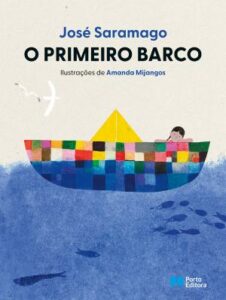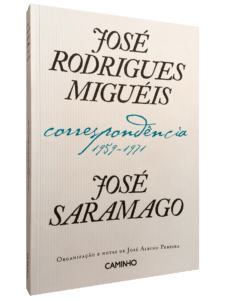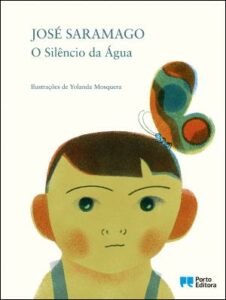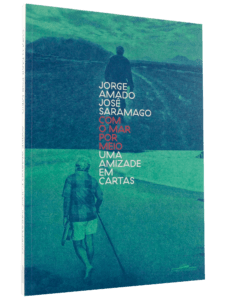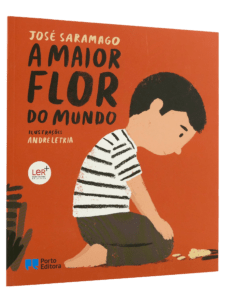Lanzarote Notebooks IV
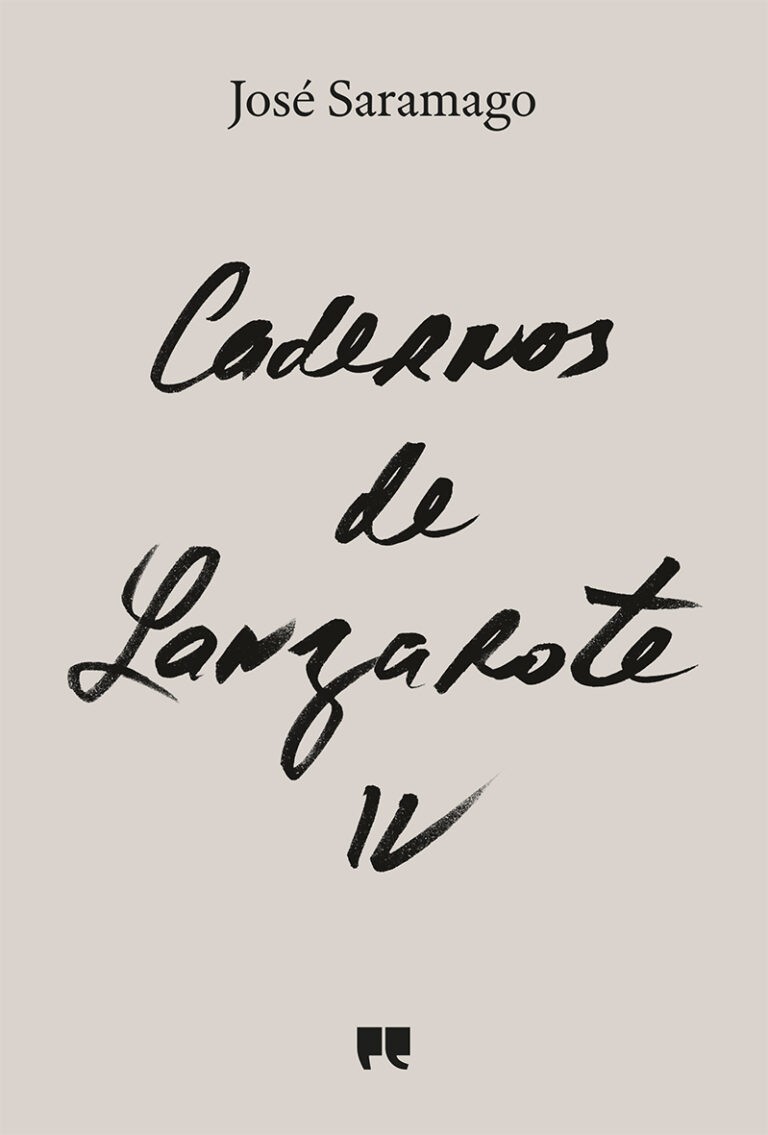
Writing a diary is like looking in a mirror of trust, trained to transform simple good looks into beauty or, in the worst cases, to make the utmost ugliness bearable. No one writes a diary to say who they are. In other words, a diary is a novel with only one character. In other words still, and finally, the central question always raised by this type of writing is, I believe, that of sincerity.
Foundation
Portugal
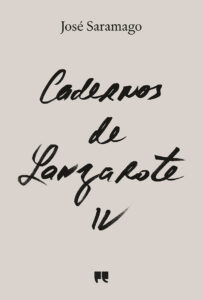
The calligraphy on the cover is by the writer Nélida Piñon.
Once again Saramago counting the days on his fingers, and meditating on events, people, landscapes, politics. A whole year in a book — Diário IV — written in the harshness of Lanzarote, but where the world Saramago visits every day belongs, even if only through the news sent to him from thousands of places.
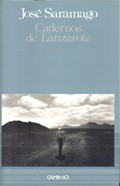
Path – Leya
1998, 5th ed., 2012
Language
Portuguese
Once again Saramago counting the days on his fingers, and meditating on events, people, landscapes, politics. A whole year in a book — Diário IV — written in the harshness of Lanzarote, but where the world Saramago visits every day belongs, even if only through the news sent to him from thousands of places.
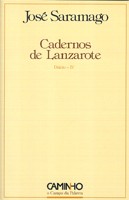
Path – Leya
1998, 5th ed., 2012
Language
Portuguese
Once again Saramago counting the days on his fingers, and meditating on events, people, landscapes, politics. A whole year in a book — Diário IV — written in the harshness of Lanzarote, but where the world Saramago visits every day belongs, even if only through the news sent to him from thousands of places.
Brazil
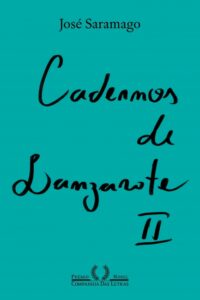
2023 (included in the work Lanzarote Notebooks II with writings from the years 1996 and 1997)
Language
Portuguese
The calligraphy on the cover is by the writer Jeferson Tenório.
The great Portuguese storyteller opens his diaries and offers a veritable feast of reflections and outpourings on a wide variety of topics, treated with frankness, good humor, and great intelligence.
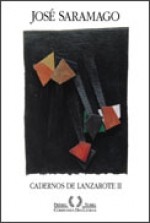
1999 (included in the work Lanzarote Notebooks II with writings from the years 1996 and 1997)
Language
Portuguese
José Saramago lives in Lanzarote, one of the Canary Islands. There, in 1993, he began compiling a diary, the first volume of which covers the years 1993, 1994, and 1995 (Companhia das Letras, 1997), while this one covers 1996 and 1997. The author can talk about everything: family, friends, everyday things, extraordinary things, constant travels, Brazil, the many Brazilians he knows, the tasks arising from his profession, his writing style, etc. For a writer, keeping a diary is work. The tone may be more informal and no project is explicitly stated, but the work is legible on every page. Between things and people, habits and decisions, affections and ideas, José Saramago's work is to choose his affinities and generate his humanizing writing.
Spain
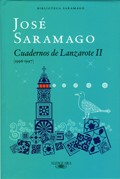
2011 (Saramago Library Collection) (Translated by Eduardo Naval) (included in the work Cuadernos de Lanzarote (1996-1997))
Language
Spanish
José Saramago reveals to us in these pages his day to day experience in Lanzarote, where he spent his residence in 1993. He is accompanied by questions and answers, of certain and radiant opinions about the closest and most general, of comments about friends and about the world that has touched him, that has touched us, living.
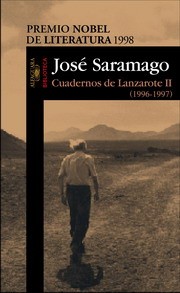
2001 (Trans.: Eduardo Naval)(included in the work Cuadernos de Lanzarote (1996-1997))
Language
Spanish
José Saramago reveals to us in these pages his day to day experience in Lanzarote, where he spent his residence in 1993. He is accompanied by questions and answers, of certain and radiant opinions about the closest and most general, of comments about friends and about the world that has touched him, that has touched us, living.
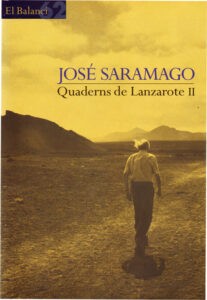
Editions 62
2001 (Translated by Núria Prats)
Italy
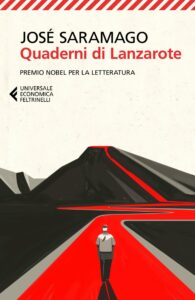
2023 (Translated by Rita Desti) (included in the work Quaderni di Lanzarote; Selection of Texts)
Language
Italian
“La riverenza e la deferenza som virtù perverse que easimente puedo convertirsi en soggezione e humiliazione”
For the fury of the polemic aroused by the publication of his book Il Vangelo secondo Gesù Cristo appeared in 1991, José Saramago decided to transfer it, in a sort of autoesilio, from Portogallo to Lanzarote, in Canarie. That great Lusitanian writer began to have a negative story between 1993 and 1997, a sort of daily diary, which came together in the Quaderni di Lanzarote. Lettere indirizzate alla moglie Pilar, agli amici più stretti e agli scrittori incontrati nel corso di una vita letteraria, que hanno la forza di segnare un vero e proprio mundo sentimentale, dove traspare la sua vena più personale e riservata. I'm already very important in its evolution, which is already very important in its contribution to its achievement of the Nobel Prize (which was awarded in 1998). Accanto alla presenza della moglie Pilar, trovano quindi spazio molte riflessioni sulla scriptura, senza certain dimenticare la bellezza del paesaggio, dell'isola di Lanzarote e delle Canarie. A magic cornice for one I gave great writings from the second dopoguerra.
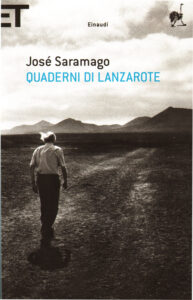
Einaudi
2010; 2011 (Translated by Rita Desti) (included in the work Quaderni di Lanzarote; Selection of Texts)
Language
Italian
«Write a diary and save it in one specchio di fiducia, adding it to transforming it into a beauty that always looks beautiful, in the peggiore dei casi, rendering sopportabile the bruttezza massima. Nessuno write a diary per dire chi è. In other parole, a diary is a novel with a solo character».
This edition is a scelta on the page published in Cadernos de Lanzarote between 1994 and 1998. The last novel by José Saramago (Azinhaga, 1992) published by Einaudi is Il viaggio dell'elefante.
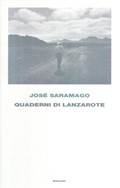
Einaudi
2010; 2011 (Translated by Rita Desti) (included in the work Quaderni di Lanzarote; Selection of Texts)
Language
Italian
«Write a diary and save it in one specchio di fiducia, adding it to transforming it into a beauty that always looks beautiful, in the peggiore dei casi, rendering sopportabile the bruttezza massima. Nessuno write a diary per dire chi è. In other parole, a diary is a novel with a solo character».
This edition is a scelta on the page published in Cadernos de Lanzarote between 1994 and 1998. The last novel by José Saramago (Azinhaga, 1992) published by Einaudi is Il viaggio dell'elefante.
Mexico
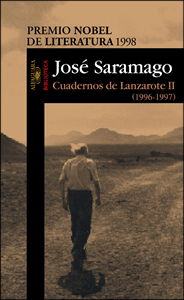
Alfaguara
(included in the work Cuadernos de Lanzarote (1996-1997))
Language
Spanish
A diary from 1996 to 1997 that narrates Saramago's meetings with Chomsky, Goytisolo, Mailer, Jorge Amado, Sábato and Fuentes; conversations, reflections and analysis of contemporary society; where he demonstrates that nothing escapes the gaze of a writer committed to his space and his time.
